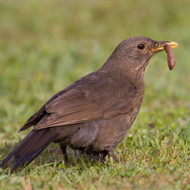Early birdwatchers catch the worm

The British Trust for Ornithology has carried out its early bird survey
Bird enthusiasts have been helping take part in a British Trust for Ornithology (BTO) survey today.
The trust says long, cold winter nights can be a precarious time for small garden birds who can lose a significant proportion of their body weight just trying to keep warm.
They need to refuel as soon as possible the next morning in order to replenish lost energy reserves.
Our gardens provide winter havens for our birds. Around half of all British householders are thought to feed their birds, providing an important resource when food is scarce in the wider countryside.
In 2004, the BTO’s Shortest Day Survey revealed that urban birds could afford to get up later than their rural counterparts due to increased temperatures in towns and cities.
However, in studies elsewhere in the world, light pollution has been shown to have an important effect on the behaviour of birds.
It is these effects of urbanisation that the BTO is investigating through today's "early bird survey" which saw people get up early to record the level of bird activity in their gardens.
Image by Liz Cutting.



 The Greyhound Board of Great Britain has published new vaccination guidance, with all greyhounds registered from 1 January, 2027 required to have the L4 leptospirosis vaccination, rather than L2.
The Greyhound Board of Great Britain has published new vaccination guidance, with all greyhounds registered from 1 January, 2027 required to have the L4 leptospirosis vaccination, rather than L2.